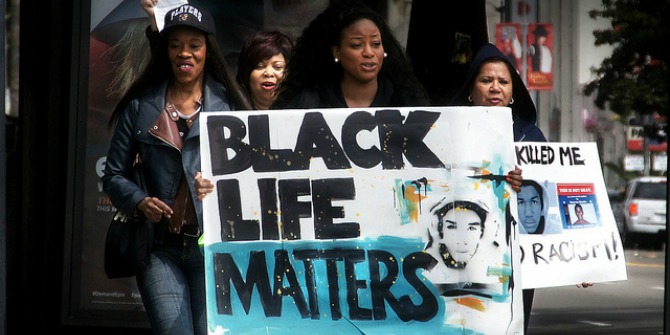 When political science scholars first asserted the essential connection between political parties and democracy, most of the world’s democracies were parliamentary. Yet by the dawn of the twenty-first century, most new democracies had directly elected presidents. David Samuels and Matthew Shugart provide a theoretical framework for analyzing variation in the relationships among presidents, parties, and prime ministers across the world’s democracies, revealing the important ways that the separation of powers alters party organization and behaviour. Jack Blumenau applauds the authors’ enormous data collection project, which examines biographical information of all prime ministers and presidents in democratic countries from 1945 to 2007.
When political science scholars first asserted the essential connection between political parties and democracy, most of the world’s democracies were parliamentary. Yet by the dawn of the twenty-first century, most new democracies had directly elected presidents. David Samuels and Matthew Shugart provide a theoretical framework for analyzing variation in the relationships among presidents, parties, and prime ministers across the world’s democracies, revealing the important ways that the separation of powers alters party organization and behaviour. Jack Blumenau applauds the authors’ enormous data collection project, which examines biographical information of all prime ministers and presidents in democratic countries from 1945 to 2007.
Presidents, Parties and Prime Ministers: How the Separation of Powers Affects Party Organization and Behaviour. David J. Samuels and Matthew S. Shugart. Cambridge University Press. July 2010.
Do political constitutions matter for democratic quality? As the green shoots of democracy struggle to break through in many parts of the Arab world, such questions have renewed relevance for policymakers. However, the comparative literature on presidential and parliamentary systems has largely focussed on the differential impact of constitutional choice on the survival of democracy. While such research constitutes a valuable normative endeavour, an impasse has formed between those such as Linz, who believe that presidentialism is ‘perilous’ for democratic survival, and those who believe such fears are overstated, such as Power and Gasiorowski or Cheibub, Pzworski and Saigh. The intractability of this impasse constitutes a significant challenge to institutionalist accounts of comparative politics, and a failure to offer guidance on this most pressing issue could expose the discipline to accusations of buck-passing.
The publication of this new volume by David Samuels and Matthew Shugart – two heavyweights of the comparative presidential literature – is therefore a welcome progression, as it attempts to move beyond the dichotomous ‘better-or-worse’ debate, and instead focuses on the effect of constitutional structure on a crucial aspect of democratic politics: political parties.
Samuels and Shugart argue that parties and party politics differ under different constitutional formats. As they put it, political parties are presidentialized by the separation of powers. They approach their investigation through the lens of principal-agent analysis. In all principal-agent relationships, principals who hire agents face potential agency losses – situations in which the agent’s actions diverge from the principal’s interests. By characterizing the relationship between a political party and the executive actor (prime minister or president) as that of a principal and an agent, they argue that political parties in presidential systems are more prone to agency loss than are parties in parliamentary systems. The two most innovative expressions of this argument are presented in chapters three and four of the book.
Chapter three considers the problem of adverse selection, and argues that parties in all systems are faced with the difficulty of selecting as leader both a loyal party servant and an election-winning figurehead. In parliamentary systems, the skills needed to win prime ministerial office often correlate highly with the skills that makes one a good party servant – such as the ability to coordinate the party’s legislative contingent, and embodying the party vision. By contrast, in presidential systems, the qualities that make a potential candidate useful for pursuing party goals are not necessarily the same as the qualities needed to win a presidential election – such as having a widely appealing and suprapartisan public image. At heart, the argument here is that when voters play a direct role in electing national leaders, parties are forced to choose leaders who will appeal to the mass electorate, even if these individuals are less likely to reliably and consistently pursue party goals.
In a herculean data collection effort examining biographical information of all prime ministers and presidents in democratic countries from 1945 to 2007, the authors show that presidents overwhelmingly tend to have weaker ties to their parties than do prime ministers. Presidents are more typically ‘outsiders’, having less experience in high profile party jobs prior to their ascendance to high office. Thus, they suggest, the adverse selection problems that plague presidential parties lead to significant agency loss, as ‘outsiders’ presidents are more likely to stray from the party line and pursue policies that differ from the goals of their principals.
Chapter four deals with moral hazard – the phenomenon that occurs when an agent violates the terms of a contract after it has been signed. Why is this particularly a problem for presidential parties? For Shugart and Samuels, presidential parties lack a mechanism through which they can get rid of a leader who violates a party-president contract whilst that leader is still in office. While parliamentary parties are able to fire their leaders through practices of parliamentary deselection, presidents are virtually immune to intraparty deselection attempts. Thus, once gaps between principal and agent have emerged, the absence of a confidence vote in presidential systems means that there is no way for presidential parties to rid themselves of disobedient agents – again increasing agency losses relative to parliamentary parties. They show that nearly a third of prime ministers leave office due to intra-party politics, where only one in over two-hundred presidential changes resulted from intra-party politics. These arguments lead to a damning conclusion of presidential constitutions. In perhaps the strongest expression of their view of presidentialism, Samuels and Shugart suggest that “responsible parties as conceived in the literature cannot exist under the separation of powers.”
However, there are a number of weaknesses that crucially undermine this relentlessly negative conclusion. First, a lack of high-profile party experience does not necessarily imply that “prospective agents will fail to pursue their promised course of action.” For example, recent expert survey evidence by Wiesehomeier and Benoit has shown that the ideological differences between presidents and their parties vary according to institutional variation within the presidential regime-type such as the concurrence or non-concurrence of elections or the size of the electoral districts.
Likewise, parties themselves can institute sub-constitutional reforms in order to further mitigate adverse selection problems. Primary elections are designed for the express purpose of allowing political parties to choose a presidential candidate who represents their interests, and candidates must appeal to this party constituency before they are able to appeal to a national constituency. These types of institutional innovations are ignored by Shugart and Samuels in their discussion, but constitute important and commonly used remedies to some of the problems that they associate with presidential systems.
Finally, Shugart and Samuels also overlook potential remedies to the problem of moral hazard. If agents fail to adhere to a contract, then the principal can either dismiss the agent or the principal can build safeguards into the original contract which limit the freedom that the agent has to operate within. One such safeguard would be for the party to control important institutions that form a part of the legislative process, such as the ability to manage the legislative agenda. If the presidential party controls the tools of legislative agenda setting, the problem of moral hazard is sharply reduced, as legislative behaviour on behalf of the president that runs contrary to the preferences of the president’s party is largely irrelevant, as the party can always block unpopular presidential proposals (Cox and McCubbins, 2005).
Schattschneider tells us that “modern democracy is unthinkable save in terms of political parties” and thus the impact that constitutional choice has on parties is certainly a subject worthy of study. However, while Shugart and Samuels take a step forward by narrowing the focus to this singular facet of democracy, they remain trapped by the dichotomous distinction between regime-types. By failing to disaggregate their independent variable beyond a parliamentary/presidential dummy, this study leads to an unconvincing and unsatisfying conclusion. Our normative discussions and prescriptions for constitutional design ought to concentrate as much on the internal workings of democratic systems as on the choice between presidential and parliamentary regimes.
——————————————————————————————-
Jack Blumenau completed an MPhil in European Politics and Society at the University of Oxford in 2012, having graduated from the LSE with a degree in Government in 2010. He is currently working towards a PhD in Political Science at the LSE. His research interests include legislative politics, party politics, the politics of the EU and the politics of the arts. Read more reviews by Jack.






